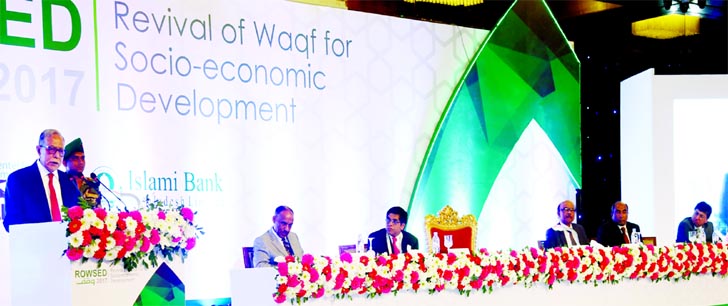
UNB, Dhaka :
President Abdul Hamid on Saturday stressed the need for reforming and modernising Waqf management, aiming to institutionalise Waqf property for the greater welfare of the community.
“Although Waqf property in Bangladesh are administered by respective laws and regulations, we need to reform and modernise it. Some Muslim countries have been successful in institutionalising Waqf resources for the greater welfare of the community,” he said.
The President was addressing the inaugural ceremony of an international workshop on ‘Revival of Waqf for Socio-economic Development’ jointly arranged by Islamic Research and Training Institute, Islami Bank Bangladesh Limited and Centre for Zakat Management at Sonargaon Hotel in the capital.
About the role of Waqf, he said the charity had played a major source of revenues and contributed enormously to the development of education, healthcare, poverty alleviation and social welfare of the society in the golden era of Muslim history.
Noting that many educational institutions, orphanages, and mosques are based on Waqf property, Hamid said it indicates that Waqf has got a deep root in society and culture.
“It is our responsibility to explore the creative ideas for better utilisation of this past golden heritage. It is not only for the benefit of society itself, but it is also for the sake of individual’s spiritual development.”
With the participation of the private sector, he said, the government may expedite the pace of eradication of poverty under the umbrella of these successful social enterprises.
Hamid said some Islamic banks have introduced Cash Waqf as a new product of savings and perpetual charity while Centre for Zakat Management (CZM) has been implementing different poverty alleviation projects by effectively utilising Zakat and Waqf fund.
“I hope more banks and organisations will come forward to establish such institutions as part of their responsibilities to society,” he said.
The President said Waqf is a voluntary charity characterised by perpetuity and its purposes include educational institutions, healthcare services, public facilities and religious establishment such as masjid, orphanage, and graveyard have immensely contributed to society.
Therefore, he said, the strength of Waqf has a direct effect to enhance the capabilities of the poor to take care of themselves and its benefit may be used for every religion not for Muslim only.
Hamid asked the affluent people to come forward to donate through different methods of Waqf for thr wellbeing of the disadvantaged community, which will facilitate the government efforts to eradicate poverty, ensuring social safety-net and achieving SGDs.
He also called upon scholars to put in their full endeavours to discover the essence of different Islamic financial instruments, including Zakat and Waqf, to support the disadvantaged community.
Bangladesh Bank governor Fazle Kabir and Islami Bank chairman Arastoo Khan, among others, spoke on the occasion.
President Abdul Hamid on Saturday stressed the need for reforming and modernising Waqf management, aiming to institutionalise Waqf property for the greater welfare of the community.
“Although Waqf property in Bangladesh are administered by respective laws and regulations, we need to reform and modernise it. Some Muslim countries have been successful in institutionalising Waqf resources for the greater welfare of the community,” he said.
The President was addressing the inaugural ceremony of an international workshop on ‘Revival of Waqf for Socio-economic Development’ jointly arranged by Islamic Research and Training Institute, Islami Bank Bangladesh Limited and Centre for Zakat Management at Sonargaon Hotel in the capital.
About the role of Waqf, he said the charity had played a major source of revenues and contributed enormously to the development of education, healthcare, poverty alleviation and social welfare of the society in the golden era of Muslim history.
Noting that many educational institutions, orphanages, and mosques are based on Waqf property, Hamid said it indicates that Waqf has got a deep root in society and culture.
“It is our responsibility to explore the creative ideas for better utilisation of this past golden heritage. It is not only for the benefit of society itself, but it is also for the sake of individual’s spiritual development.”
With the participation of the private sector, he said, the government may expedite the pace of eradication of poverty under the umbrella of these successful social enterprises.
Hamid said some Islamic banks have introduced Cash Waqf as a new product of savings and perpetual charity while Centre for Zakat Management (CZM) has been implementing different poverty alleviation projects by effectively utilising Zakat and Waqf fund.
“I hope more banks and organisations will come forward to establish such institutions as part of their responsibilities to society,” he said.
The President said Waqf is a voluntary charity characterised by perpetuity and its purposes include educational institutions, healthcare services, public facilities and religious establishment such as masjid, orphanage, and graveyard have immensely contributed to society.
Therefore, he said, the strength of Waqf has a direct effect to enhance the capabilities of the poor to take care of themselves and its benefit may be used for every religion not for Muslim only.
Hamid asked the affluent people to come forward to donate through different methods of Waqf for thr wellbeing of the disadvantaged community, which will facilitate the government efforts to eradicate poverty, ensuring social safety-net and achieving SGDs.
He also called upon scholars to put in their full endeavours to discover the essence of different Islamic financial instruments, including Zakat and Waqf, to support the disadvantaged community.
Bangladesh Bank governor Fazle Kabir and Islami Bank chairman Arastoo Khan, among others, spoke on the occasion.

